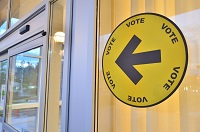

by Maurice Y. Michaud (he/him)
 You have reached what is without any doubt the largest and most complete reference on all federal and provincial or territorial general elections, by-elections and referendums ever held in Canada. Whether you are an historian, a political or social scientist, a teacher, a student, a politician, a statistical “quant jock,” a journalist, or a citizen who like me admits to being a fan of Canadian or Quebec politics, this website is sure to engage you in hours of exploration — or will quickly give you the answer to that nagging question that brought you here in the first place, like: “When, where and for which party did Uncle Charlie run and didn’t only get defeated but was completely humiliated ?” (True story, by the way...)
You have reached what is without any doubt the largest and most complete reference on all federal and provincial or territorial general elections, by-elections and referendums ever held in Canada. Whether you are an historian, a political or social scientist, a teacher, a student, a politician, a statistical “quant jock,” a journalist, or a citizen who like me admits to being a fan of Canadian or Quebec politics, this website is sure to engage you in hours of exploration — or will quickly give you the answer to that nagging question that brought you here in the first place, like: “When, where and for which party did Uncle Charlie run and didn’t only get defeated but was completely humiliated ?” (True story, by the way...)